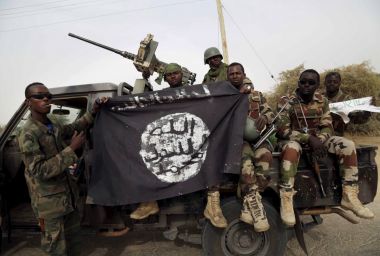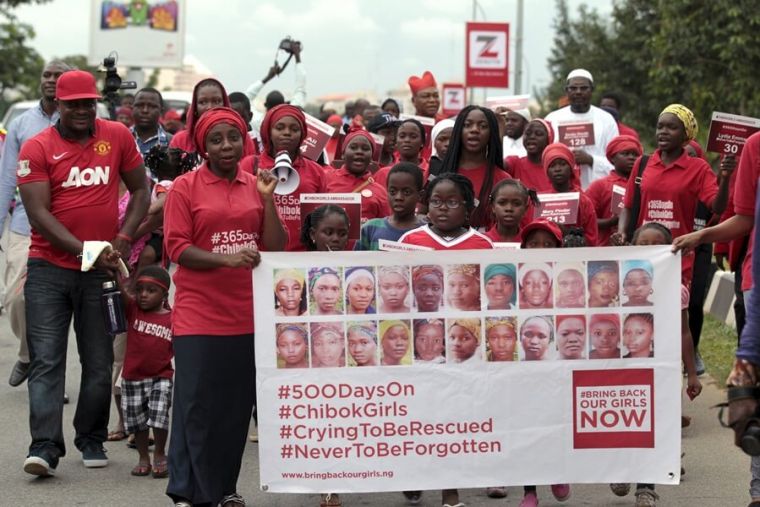One Nigerian woman's fight against Boko Haram

After surviving a violent bus attack that left five passengers dead, Hafsat Mohammed moved to North Eastern Nigeria to try and counter the violent extremism of Boko Haram through interfaith work. But since August, she has been practically house bound after receiving death threats from the militant group.
Following the bus attack, the mother of three asked herself, "What do you do to conquer this [violence]?" she told Al Jazeera.
Her answer to this question was to engage young people at a grassroot level, enabling them to hope for a different future and equip them to achieve it.
For the past year, she has been doing just that; working at a community-led Interfaith MediationCentre founded by a Muslim imam and a Christian pastor to address interreligious violence.
Speaking to Al Jazeera, Mohammed described how she and a Christian colleague, Samson Atua, would visit schools. They witnessed classrooms becoming unofficially segregated by religion as communities grew increasingly divided.
"If the student is Muslim they're taught, 'Oh [the teacher] is a Christian, don't relate with her,' or if he's a Christian, 'Your teacher is a Muslim, don't go close to her,'" she said.
"There has been resistance from the Christian teachers and the Muslim teachers, and we had to give references from the Quran and the Bible.
"I can sing choir songs and Christmas carols, and the kids say 'I dare you,' and I do. The kids and pastors are surprised, with the hijab and all."
When growing up in Kaduna, said Atua, "You never knew who was a Christian, [and] who was a Muslim." But now, he says, "hate is the issue of the day".
The kidnapping of the Chibok schoolgirls and the Bring Back Our Girls campaign that arose as a result has meant the Nigerian conflict can give a unique insight into the dynamic yet complicated role of women within such crises.
The UN Security Council Counter Terrorism committee held an unprecedented meeting on the role of women in countering violent extremism in September, hosting female experts from Iraq, Kenya and Nigeria.

Pastor Esther Ibanga, an activist for interfaith peace in Plateau State, Nigeria, believes women play a crucial role.
Although in Nigeria their involvement is often seen as "taboo and sometimes quite offensive to the men, women civil society groups tap into the needs of communities, where women and children are disproportionately impacted by terrorism," he explained.
Mohammed sees the best counter-attack to Boko Haram and other extremist ideologies as the provision of a counter message.
"The question we ask is what narrative are we putting out there to counter what Boko Haram is saying? What are we telling the people?" she said.
"It's for us to give a different narrative. If Boko Haram is saying Western education is forbidden, why are they on Youtube? ... Why are they driving cars and using assault rifles? Why are they not using horses and donkeys or their own legs? These are people saying education is forbidden but they're using education."
She has found most young men are receptive to her work, but some older men have responded differently.
"Some felt I was being disrespectful, that I wasn't being a lady, that I should be at home, married, having babies like a baby factory, but that wasn't what I was created for," she said.
"I am confident, I am strong, I am a Muslim, I am an anti-violent-extremism activist, I advocate against it and I will do whatever I can to stop it. A lot of time I talk in front of people and they say, 'You're a woman, you don't need to talk.' And I say, 'Yes, I will talk.'"
In December 2014, Mohammed moved to Damaturu, the capital of Yobe state. It is the alleged birthplace of Boko Haram leader Abubakar Shekau, and has been rocked by violence in recent years.
After a bomb explodes, "people just continue their business," she said. "If it's a really bad attack, they'll put [a] curfew just for a day."
Dialogue and positive messages are the only hope to prevent the anger and frustration from leading young people to pick up guns themselves, she added.
After Muhammadu Buhari's landslide election victory in April, Mohammed organised a symposium for youth around the northeast to discuss everything from leadership to jobs.
We were working on "getting youth on their toes," she said.
Mohammed has worked stridently in seeking grassroot means by which to engage youth in their futures rather than leaving them to resort to violence.
She set up Choice for Peace, Gender and Development to help young people and women whose family members have been taken, whether abducted, recruited or killed by Boko Haram.
"I feel the pain of other mothers," she says. "They feel helpless to prevent it."
But not everyone is pleased with her work. After years of working stridently for victims of Boko Haram, since August she has been receiving calls from three different voices, all men. They have each told her the same thing: "When the time is right, we will find you and we will kill you."
Her three children live with her father and the men claim to know where they are, and have threatened to kill her daughter.
"Ever since this recent [threat]...every day I sit alone, I get feverish, I get sick," she said. "I get really confused at times, I'm really scared. I know I'm safe but the thought, it keeps coming."
She is now driven straight from her office home and spends her evenings in her flat.
"[Last year], I was fearless; I would go back to Yobe and stay there, I wouldn't leave and no one could convince me to leave, but I've been holding on strong for a long time and I'm breaking down," she said. "Now the trauma is in my head."
Sitting in her room alone, she told Al Jazeera that despite wanting "changes in this country", right now is time to look after herself.











